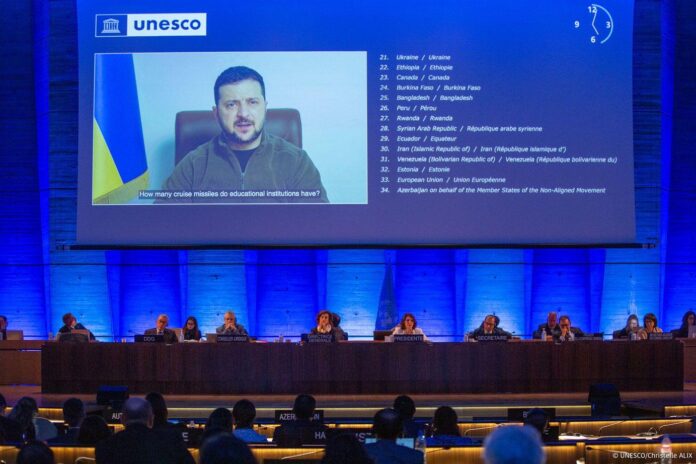The Ukrainian President Volodymyr Zelensky made a formal application for Unesco World Heritage status for the historic centre of Odesa yesterday. The city is a key strategic port on the Black Sea and has been bombed several times by Russia since its invasion of Ukraine earlier this year.
Speaking in a pre-recorded video to a meeting of Unesco’s executive board in Paris, Zelensky said the status is necessary to protect Ukraine’s cultural heritage from Russia, which he referred to a terrorist state and called for its expulsion from the organisation.
“It is inadmissible to let Russia destroy the authority of Unesco,” he said in the video. “The terrorist state must be excluded from all Unesco bodies and from the organisation itself. Let it be a historical example for everyone in the world that no one will tolerate an enemy of culture, an enemy of history, an enemy of education, an enemy of science,” said Zelensky, who visited Odesa’s commercial port in July after Russian missile strikes threatened critical international grain exports.
“Given daily threats of Russian strikes we must provide a clear signal that the world will not turn a blind eye to the destruction of our common history, our common culture, our common heritage,” Zelensky said in the video. “One of the steps for this should be the preservation of the historical centre of Odesa —a beautiful city, an important port of the Black Sea and an important source of culture for millions of people in different countries.”
Alexander Kuznetsov, Russia’s permanent representative to Unesco, told the Rossiya-24 news channel in August that Unesco’s “fuss around Odessa was started not for the sake of this beautiful city, but for staging another anti-Russian show,” the official Tass news agency reported.Kuznetsov is chairperson of the Bureau of the World Heritage Committee.
Unesco’s director-general Audrey Azoulay said Ukraine’s application for Odesa “marks confidence in Unesco’s protection mechanisms” and described the city as “a melting pot of exchange and migration” with “a heritage and a history that resonates with people around the world and stands as a powerful symbol.”
Zelensky asked the World Heritage Committee to fast-track the process. He has made previous demands for the exclusion of Russia from Unesco. The Art Newspaper understands that it is legally impossible to expel Russia since it is a member state of the United Nations, so his words are regarded as a statement of principle. Russia is one of the current 21 members of Unesco’s World Heritage committee.
The 45th annual World Heritage Committee session of Unesco that had been scheduled to take place in June in Kazan, the capital of the Russian republic Tatarstan, was postponed indefinitely after protests over the damage inflicted by Russian to Ukraine’s cultural heritage.
Odesa, known for centuries for its cosmopolitan architecture and atmosphere, has been on Unesco’s World Heritage Tentative List since 2009. The city’s most famous historic sites include the Odesa Opera House, which became a symbol of resilience when it reopened in June, and giant stairway to the harbour immortalised in Sergei Eisenstein’s 1925 silent film Battleship Potemkin.
Catherine the Great’s role in the city’s history has become a point of controversy as Ukraine disengages from Russian imperial connections. A tsarist era monument to Catherine was torn down in communist times. A copy installed in 2007 was officially sponsored by a local businessman, but Ukrainian media have reported that Rossotrudnichestvo, a Russian government organisation, was the source of funds and a new campaign is calling for its removal. A petition to replace the Russian empress with a statue of gay porn star Billy Harrington drew thousands of signatures.
The city’s other major landmark is a monument dedicated to the Duke de Richelieu, a Frenchman who became Odesa’s most famous tsarist governor in the 19th century.
Unesco has already stepped up its support for Odesa by providing funding for repair of war damage to the Odesa Art Museum, support for digitisation of art and archival materials in the city, and supplying equipment, including sandbags and gas masks, to the regional government for protection of cultural properties.

























